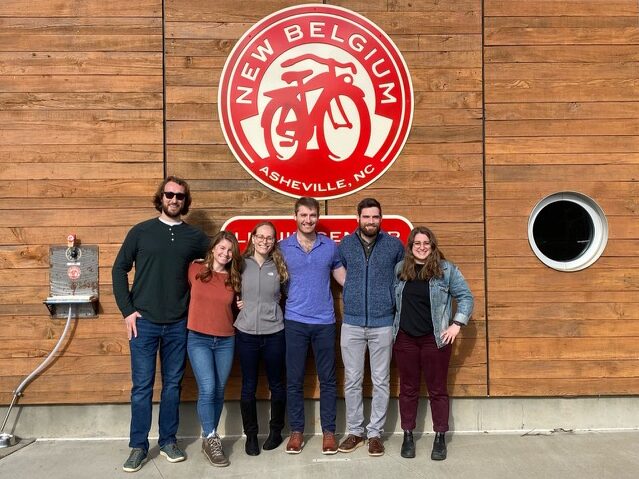Written By:
Zoe Kurtz ’22
Contributing Writer
Connect with Zoe on LinkedIn
At the beginning of March, I joined five other students and traveled to Asheville, North Carolina to enjoy spring break, which included a meeting with the New Belgium sustainability team. As a SI-MBA student with a particular affection for breweries, I was fully supportive of the school-inspired detour. We were particularly interested in meeting Sarah Fraser, New Belgium’s sustainability specialist. New Belgium rides ahead of their competition as the proud brewer of Fat Tire, the first carbon neutral beer to be distributed in the US. This means that both the brewing and the sourcing of Fat Tire contributes no net carbon to the atmosphere. That’s right, something that is delicious for you is also delicious for the planet.

New Belgium’s story is novel in the industry but becoming increasingly popular as more breweries experiment with innovative sustainable techniques to brew ever more delicious beer. Traditionally, the brewing process consumes large amounts of energy and water, both in sourcing the ingredients and transforming those grains into the beverage we are all expecting. While these challenges present massive hurdles to overcome for breweries trying to reduce their environmental footprint, New Belgium is not shying away.
I was giddy walking into New Belgium’s Liquid Center in Asheville to meet Sarah. The Liquid Center is a paradise for beer lovers. The bar inside is colorful and welcoming, and the outdoor space overlooks the French Broad River, which plays host to the tasting room and brewery. As we walked in, we could see the current construction to install solar panels on the brewhouse underway: another investment New Belgium is making towards their sustainability goals. As we sat outside, absorbing the southern sun and sipping our beers, we spoke with Sarah about everything from their carbon neutrality goals, supply chain issues, their relationship with the local Asheville brewery scene, and different exciting innovations they are exploring. The experience was both surreal and validating as I saw classroom discussions transition so seamlessly into real life application in an industry I love.

Our conversation with Sarah left me with two major impressions: 1) to help achieve their sustainability goals, New Belgium’s operations could benefit from a more dedicated focus on the collection and analysis of data, and 2) the brewing industry is better positioned than most to successfully make the transition to carbon neutrality.
New Belgium is already tracking their brewery’s utilities and operational data, as well as their greenhouse gas emissions data, choosing to self-report across three defined scopes: Scope 1 emissions are all direct emissions from owned or controlled sources (such as in-building heating equipment); Scope 2 emissions are all indirect emissions from purchased electricity; and Scope 3 emissions are all indirect emissions (not included in Scope 2) that occur along the entire value chain (Greenhouse Gas Protocol). New Belgium is going the extra mile to track Scope 3 emissions – a strategic decision that exemplifies their robust commitment to sustainability. The sustainability office at New Belgium is an interdepartmental team of passionate employees. They are tasked with the collection and use of this data to help New Belgium move closer to their 2030 climate commitments. However, not having a full-time team of dedicated sustainability analysts limits the power of the data New Belgium collects.
The true power of data analytics is in how it provides companies the flexibility and creativity to experiment with innovative new approaches to their processes without investing significant capital. This process takes intention, know-how, and most importantly, time. Sarah did speak about how New Belgium is shifting the way they use their data: she highlighted some projects that use data to help estimate potential emissions reductions from changes to recipes or production processes. This shift could uncover new innovations that push New Belgium closer to their sustainability goals.
Innovation is only as valuable as it is scalable. Sarah reflects on how the industry competes for shelf space but collaborates in every other way. This is evidenced by the formation of the Brewers Association, an organizing body that allows for the space to share ideas, innovations, and best practices with fellow brewers. New Belgium is a proud member of the Brewers Association and cofounder of the Association’s sustainability subcommittee. New Belgium even took an additional step towards transparency by creating an independently run Carbon Neutral Toolkit. This website is their “How-To”, aimed at helping other small brewers reach their carbon neutrality goals. Their commitment to sharing best practices is emblematic of the camaraderie in the industry: New Belgium embraces information sharing as a way to create a more sustainable industry, rather than gatekeeping their knowledge to retain their competitive advantage.

There was something sublime about sitting outdoors next to the river, listening to the water rush past, and feeling the winter Asheville sun that made our drinks taste even better. Sarah, at one point, reflected: brewing consumes so much water and energy that those who brew understand and feel how their work is pulling those resources from the Earth. The brewing process truly connects the heart of the brewer and the soul of sustainability, encouraging the innovation we see in the brewing atmosphere in the hopes of a more environmentally friendly beverage. Connection and innovation are at the core of the brewing industry, allowing for a unique advantage to adapt to a new way of life as we all rush against the deadline of climate change.
